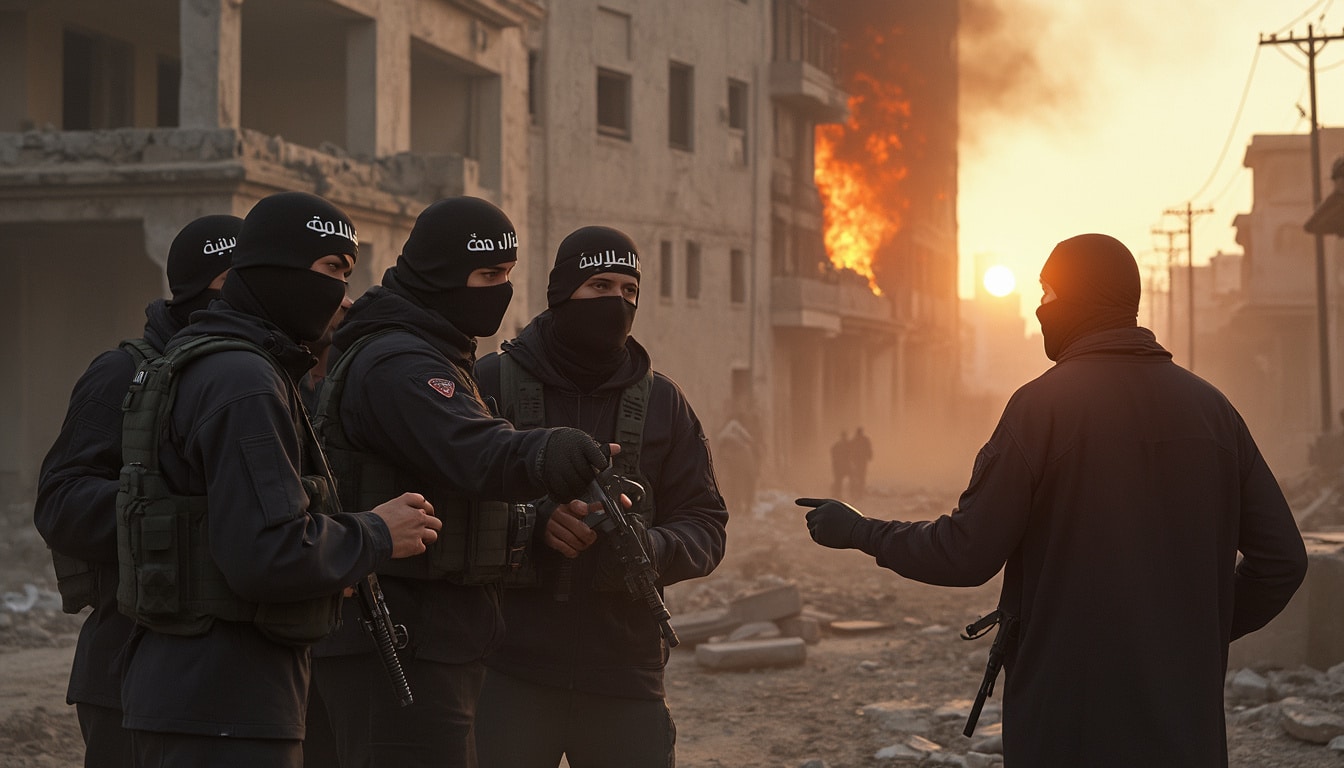The world holds its breath as Hamas announces the loss of contact with the Israeli-American prisoner, Edan Alexander, following an airstrike. This critical situation intensifies the already palpable tensions in the Gaza region. The humanitarian consequences are becoming increasingly urgent.
Since the attack on October 7, 2023, Edan Alexander, a 21-year-old soldier from Tel Aviv raised in New Jersey, has been held captive. International efforts for his release are stagnating as ongoing hostilities continue to hinder negotiations. Recent airstrikes have not only isolated the prisoner but have also exacerbated the humanitarian crisis, with reduced access to humanitarian aid for civilians. Calls for a ceasefire are multiplying as the global community seeks a peaceful resolution to this complex conflict.

The tense situation in the Israeli-Palestinian conflict has taken a new alarming turn this week. Hamas announced it has lost contact with the group holding Israeli-American hostage Edan Alexander following a targeted airstrike in Gaza. This incident raises numerous questions about the progression of disengagement attempts and the humanitarian implications in the region.
Table des matières
ToggleWho is Edan Alexander and what are the circumstances of his detention?
Edan Alexander is a 21-year-old Israeli-American soldier, born in Tel Aviv and raised in the state of New Jersey in the United States. After completing high school, he returned to Israel to serve in the military, joining an elite infantry unit tasked with protecting the Gaza borders. During the surprise attack orchestrated by Palestinian militants on October 7, 2023, Alexander was kidnapped and taken hostage.
Since his capture, Alexander has become a symbol of the brutality of the conflict, with videos showing him alive but visibly under duress, criticizing the Israeli government for its inability to secure his release. The latest report indicates that Hamas has lost all contact with its group following an airstrike, further complicating negotiation efforts.
What is Hamas’ response to this loss of contact?
The spokesperson for the Ezzedine Al-Qassam Brigades, Abu Obeida, stated on Telegram that Hamas continues to try to re-establish contact with the group holding Alexander. However, this announcement comes after a direct strike on their location in Gaza, highlighting the rising tensions and increased risks for hostages.
This loss of contact occurs in the context of renewed hostilities, with nearly a month of Israeli air and ground attacks intensifying the situation in Gaza. Among the 251 hostages taken on October 7, only 58 remain in captivity, and figures indicate that 34 may already have died.
What are the international attempts to negotiate a ceasefire?
International efforts to establish a truce have intensified despite ongoing violence. A senior Hamas official revealed that Israel had proposed a 45-day ceasefire in exchange for the release of 10 live hostages, including Edan Alexander as a “gesture of goodwill.” However, Hamas rejected this offer, insisting on its own conditions, including the release of half of the currently held hostages.
Furthermore, French President Emmanuel Macron recently expressed support for Israel’s security while emphasizing the importance of a ceasefire to ensure the release of hostages. These negotiations reflect the complexity of the situation, where Hamas’ disarmament demands and Israel’s military pursuits make any immediate peaceful resolution challenging. To learn more about the geopolitical dynamics influencing these negotiations, see this article.
What are the humanitarian impacts of this prolonged conflict?
The resurgence of Israeli airstrikes on Gaza has had devastating consequences for the civilian population. According to the United Nations Office for the Coordination of Humanitarian Affairs (OCHA), recent attacks have resulted in mass civilian casualties, with essential infrastructures such as hospitals and food distribution points being affected. A field hospital in the Kuwait field was targeted by a strike, resulting in the death of a security guard and injuries to nine others.
In six weeks, no humanitarian aid has been allowed into the region, exacerbating an already critical humanitarian crisis. President Macron stressed the urgency of opening passages to allow for the rapid delivery of necessary aid. This situation highlights the importance of an effective flight control system to ensure that aid reaches civilians without conflicting with military operations. To understand the importance of these systems in crisis situations, see this article.
How is the international community reacting to this conflict?
The international community remains divided over the Israeli-Palestinian conflict. While some countries firmly support Israel’s military actions in defense of its national security, others call for more humanitarian measures to protect civilians and facilitate the release of hostages.
The United States, for instance, remain optimistic about the possibility of a durable ceasefire, even as civilian casualties continue to rise. At the same time, European nations like France play a crucial diplomatic role in seeking to balance support for Israel while pushing for peaceful and humanitarian solutions. To analyze the impact of American political decisions on the conflict, see this article.
What are the future stakes and perspectives for resolving the conflict?
The prospects for resolving this conflict appear uncertain in the short term. With Hamas refusing ceasefire proposals that demand complete disarmament and Israel continuing its military operations, a sustainable solution remains difficult to achieve. However, international pressure could play a key role in mediating and facilitating negotiations between the parties.
Meanwhile, the importance of modern aeronautics and autonomous aerial vehicles in the current military context cannot be underestimated. These technologies could influence future defense and attack strategies, thus altering the landscape of armed conflicts. To learn more about the evolution of autonomous aerial vehicles, visit this article.
Finally, the ongoing engagement of global leaders and international organizations is essential to maintain dialogue and seek peaceful solutions. The fate of Edan Alexander and other hostages remains a focal point that could potentially pave the way for broader negotiations aimed at stabilizing the region and preventing future escalations.
What are the implications for regional and global security?
The evolution of the conflict between Israel and Hamas has repercussions far beyond the borders of Gaza and Israel. Stability in the Middle East is crucial for global security, and any escalation could trigger a chain reaction affecting various regions and international alliances. Ongoing airstrikes and hostage-taking fuel fear and uncertainty, exacerbating tensions between nations and militant groups.
Moreover, the control of advanced military technologies, such as flight control systems, plays a decisive role in how conflicts are conducted and resolved. An in-depth understanding of these systems is essential for anticipating future movements and strategies adopted by the forces involved. To explore in detail the role of test pilots and the necessary training, see this article.
In summary, the loss of contact between Hamas and the group holding Edan Alexander after an airstrike marks a turning point in an already complex conflict. The humanitarian implications, political dynamics, and technological advancements continue to shape the responses of the involved actors, making the search for a peaceful solution all the more urgent and challenging.
























